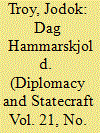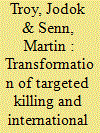| Srl | Item |
| 1 |
ID:
172105


|
|
|
|
|
| Summary/Abstract |
Next to military means, causing disruption and interdiction, Western and local powers also relied on policies of containment to halt the expansion of the Islamic State’s territorial strongholds. Yet, a Cold War state-based strategy of containment seems not apt to counter a transformed Islamic State. This article, first, examines why containing the Islamic State was successful in the past. Second, the article argues that the Islamic State can still be contained if containment addresses the Islamic State’s hybrid nature rather than convulsively looking for the transferability of past containment aspects. In particular, this requires a focus on the struggle for power of the opponent and a foreign policy of restraint. Finally, the article proposes three angles to contain the Islamic State. Each angle exploits the persisting characteristics of the Islamic State as a revolutionary actor with internal contradictions and promulgating specific narratives which containment can engage.
|
|
|
|
|
|
|
|
|
|
|
|
|
|
|
|
| 2 |
ID:
099060


|
|
|
|
|
| Publication |
2010.
|
| Summary/Abstract |
The United Nation's secretary-general from 1953 to 1961, Dag Hammarskold , whose spiritual beliefs influenced his political activity, was searching for universality and solidarity as written in the charter of the UN. While in office, Hammarskold was able to unite personal belief and political rationale. This is the main reason he became a respected and true international civil servant. Hammarskjold was neither a pure idealist nor a pure realist. This article examines the moral but not moralistic life and legacy of Hammarskjold who united mystics and realistic political engagement. In doing so it draws on the lessons learned from a "practical mystical" and international civil servant. This is chiefly done by using the English School approach of international relations theory while at same time pointing out the impact of positive mimesis. By devoting his private life to God, Hammarskjold was able to devote his political life to the UN.
|
|
|
|
|
|
|
|
|
|
|
|
|
|
|
|
| 3 |
ID:
176028


|
|
|
|
|
| Summary/Abstract |
This article argues that how the United Nations (UN) conceptualizes legitimacy is not only a matter of legalism or power politics. The UN’s conception of legitimacy also utilizes concepts, language and symbolism from the religious realm. Understanding the entanglement between political and religious concepts and the ways of their verbalization at the agential level sheds light on how legitimacy became to be acknowledged as an integral part of the UN and how it changes. At the constitutional level, the article examines phrases and ‘verbal symbols’, enshrined in the Charter of the ‘secular church’ UN. They evoke intrinsic legitimacy claims based on religious concepts and discourse such as hope and salvation. At the agential level, the article illustrates how the Secretary-General verbalizes those abstract constitutional principles of legitimacy. Religious language and symbolism in the constitutional framework and agential practice of the UN does not necessarily produce an exclusive form of legitimacy. This article shows, however, that legitimacy as nested in the UN’s constitutional setting cannot exist without religious templates because they remain a matter of a ‘cultural frame’.
|
|
|
|
|
|
|
|
|
|
|
|
|
|
|
|
| 4 |
ID:
142420


|
|
|
|
|
| Summary/Abstract |
This article examines Austria's position as a small, neutral state in the international society as framed by the English School. This examination is chiefly done in the face of the effects of great power conflicts and their impact on Western Europe's society of states. In doing so, the article provides insights to the fundamental puzzles concerning the ways power is managed between states, great and small alike. The article surveys how war (such as in South Ossetia in 2008) and war-like incidents affected Austria's position in the international society and the understanding of its place in great power conflicts between East and West. I argue that neutrality, despite European integration in the context of a peaceful international society, remains a political option for small states such as Austria. This option is especially lively if there is a domestic sentimental attachment to it and sticking to it does not undermine domestic or European and international foreign policy rationale and interests.
|
|
|
|
|
|
|
|
|
|
|
|
|
|
|
|
| 5 |
ID:
153876


|
|
|
|
|
| Summary/Abstract |
This article introduces the special issue’s question of whether and how the current transformation of targeted killing is transforming the global international order and provides the conceptual ground for the individual contributions to the special issue. It develops a two-dimensional concept of political order and introduces a theoretical framework that conceives the maintenance and transformation of international order as a dynamic interplay between its behavioral dimension in the form of violence and discursive processes and its institutional dimension in the form of ideas, norms, and rules. The article also conceptualizes targeted killing and introduces a typology of targeted-killing acts on the basis of their legal and moral legitimacy. Building on this conceptual groundwork, the article takes stock of the current transformation of targeted killing and summarizes the individual contributions to this special issue.
|
|
|
|
|
|
|
|
|
|
|
|
|
|
|
|